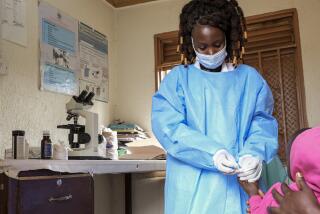Ebola Outbreak Is Confirmed in Gabon
GENEVA — An outbreak of fever in the equatorial African nation of Gabon has been confirmed as the deadly disease Ebola, the World Health Organization said Sunday.
It is the first documented outbreak of Ebola since one last year in Uganda, where 224 people--including health workers--died from the virus, WHO said. Ebola is one of the most virulent viral diseases, causing death in 50% to 90% of all clinically ill patients.
WHO spokesman Gregory Hartl said seven people have reportedly died in Gabon. WHO has already sent a team to help the Atlantic coast nation, and a second team of four specialists will leave Geneva for Gabon today, he said.
The outbreak is in remote Ogooue Ivindo province in northeastern Gabon, he said. In 1996-97, an outbreak in Gabon killed 45 of the 60 people infected.
“We’ve had very little information,” Hartl said. The confirmation came from a laboratory in Franceville, in eastern Gabon.
A team from the Gabonese Ministry of Health and the International Center of Medical Research in Franceville went to the province last week when they first received reports that the outbreak might be Ebola, Hartl said.
On Thursday, WHO experts flew to Congo, east of Gabon, to investigate a possible outbreak there.
Ebola is passed through contact with bodily fluids, such as mucus, saliva and blood, but is not airborne. The virus has also been transmitted to people from handling ill or dead infected chimpanzees, WHO said.
The virus incubates for four to 10 days before flu-like symptoms develop. Eventually, the virus causes severe internal bleeding, vomiting and diarrhea.
There is no cure, but patients treated early for dehydration have a good chance of survival.
WHO says more than 1,000 people have died of the disease since the virus was first identified in 1976 in western Sudan and Congo.
At least 17 people with Ebola-like symptoms have died in Congo since November, officials said.
More to Read
Sign up for Essential California
The most important California stories and recommendations in your inbox every morning.
You may occasionally receive promotional content from the Los Angeles Times.










